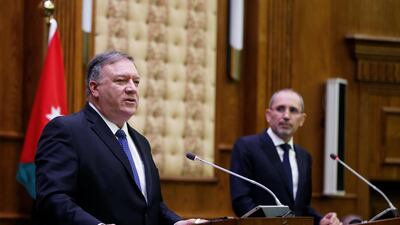Jordan’s foreign minister described the Golan Heights on Tuesday as occupied Syrian territory, demanding that Israel withdraw its forces from the area.
Ayman Safadi's comments came during a joint press conference with US Secretary of State Mike Pompeo, who landed in Amman on Tuesday on the first leg of his Middle East tour.
The remarks by Mr Safadi seem to be a response to Israeli Prime Minister Benjamin Netanyahu who told American National Security Advisor John Bolton on Sunday that Israel wants the US to recognise its sovereign claim over the Golan Heights.
“The Golan Heights are occupied Syrian territory. International law is clear on that. It has to be treated as such,” Mr Safadi told reporters. “Therefore, our position is that Israel needs to withdraw from that territory in the framework of a peace agreement.”
________________
Podcast: Pompeo's timely tour
________________
Israel captured the Golan Heights from Syria during the 1967 Middle East war. It unilaterally annexed the area in 1981, in a move that wasn't recognised internationally.
The UN Security Council has maintained the illegality of measures taken by Israel "to impose its laws, jurisdiction and administration on the occupied Syrian Golan," adding that "acquisition of territory by force is inadmissible under international law."
________________
Read more:
UNRWA looks to Gulf countries for support in the long term
Saeb Erekat: Trump administration is trying to divide Palestinian leadership
Israeli soldiers kill three in Gaza and one in West Bank
________________
The US hasn't recognised Israel's sovereignty over the Golan Heights, but in November for the first time, the US said it planned to vote against a UN resolution calling for Israel to end its occupation of the area.
In a joint conference with Mr Bolton on Sunday, Mr Netanyahu said that Israel will "never leave the Golan Heights" and added that "it's important that all countries recognise Israel's sovereignty" over the contested region.
Mr Pompeo is meeting with US allies in the region, including stops in Jordan, Egypt and several Gulf nations, to coordinate an anti-Iran campaign.
During the joint press conference in Amman on Tuesday, Mr Pompeo contended that the planned withdrawal from Syria would not complicate the administration's anti-Iran campaign. He said US allies in the region, including Jordan, agree on what they view as the "enormous risk" Iran poses for the region.
“The president's decision to withdraw our folks from Syria in no way impacts our capacity to deliver on that," he said. "You will see in the coming days and weeks that we are doubling not only our diplomatic but our commercial efforts to put real pressure on Iran to achieve what it is we set out for them back in May."

